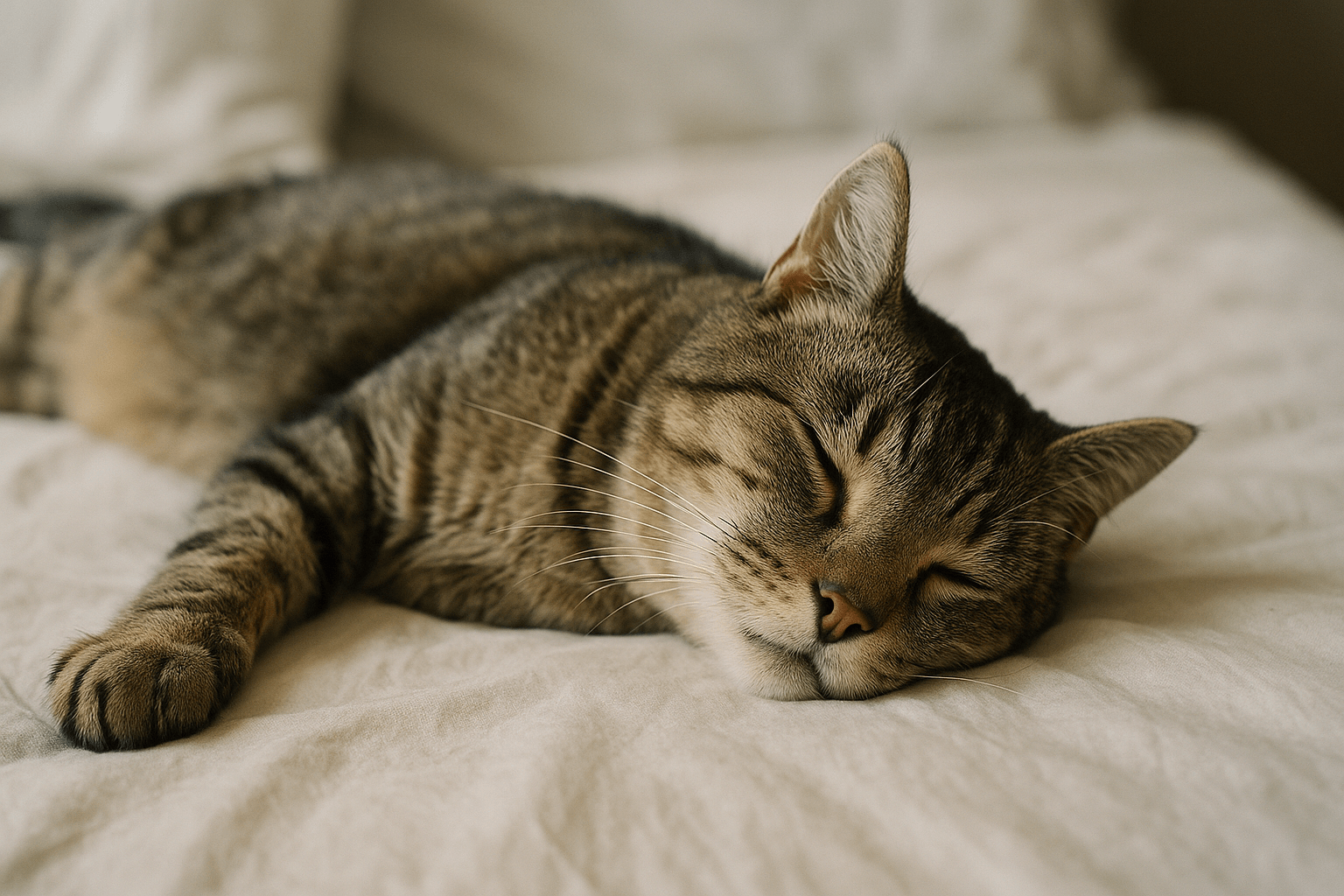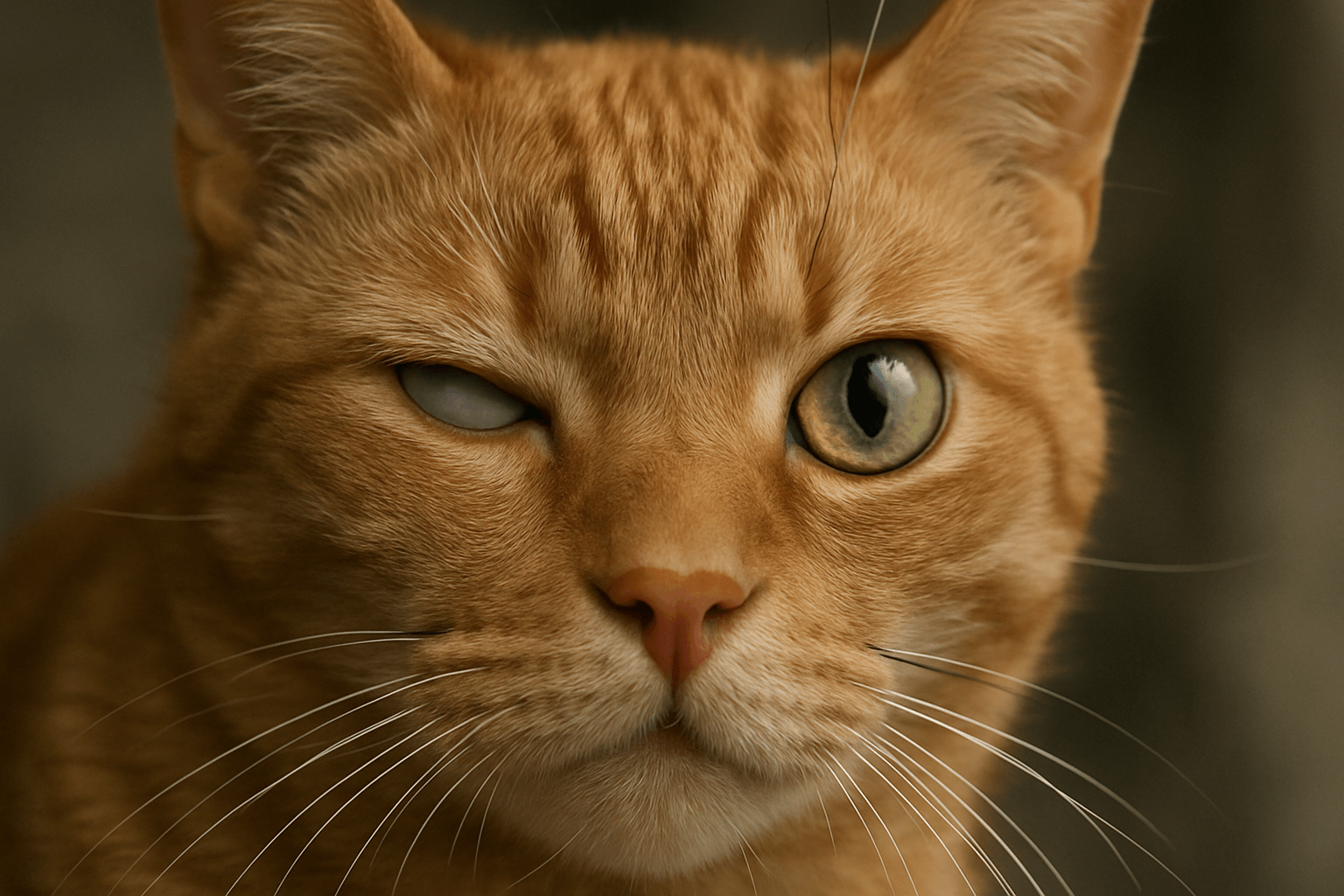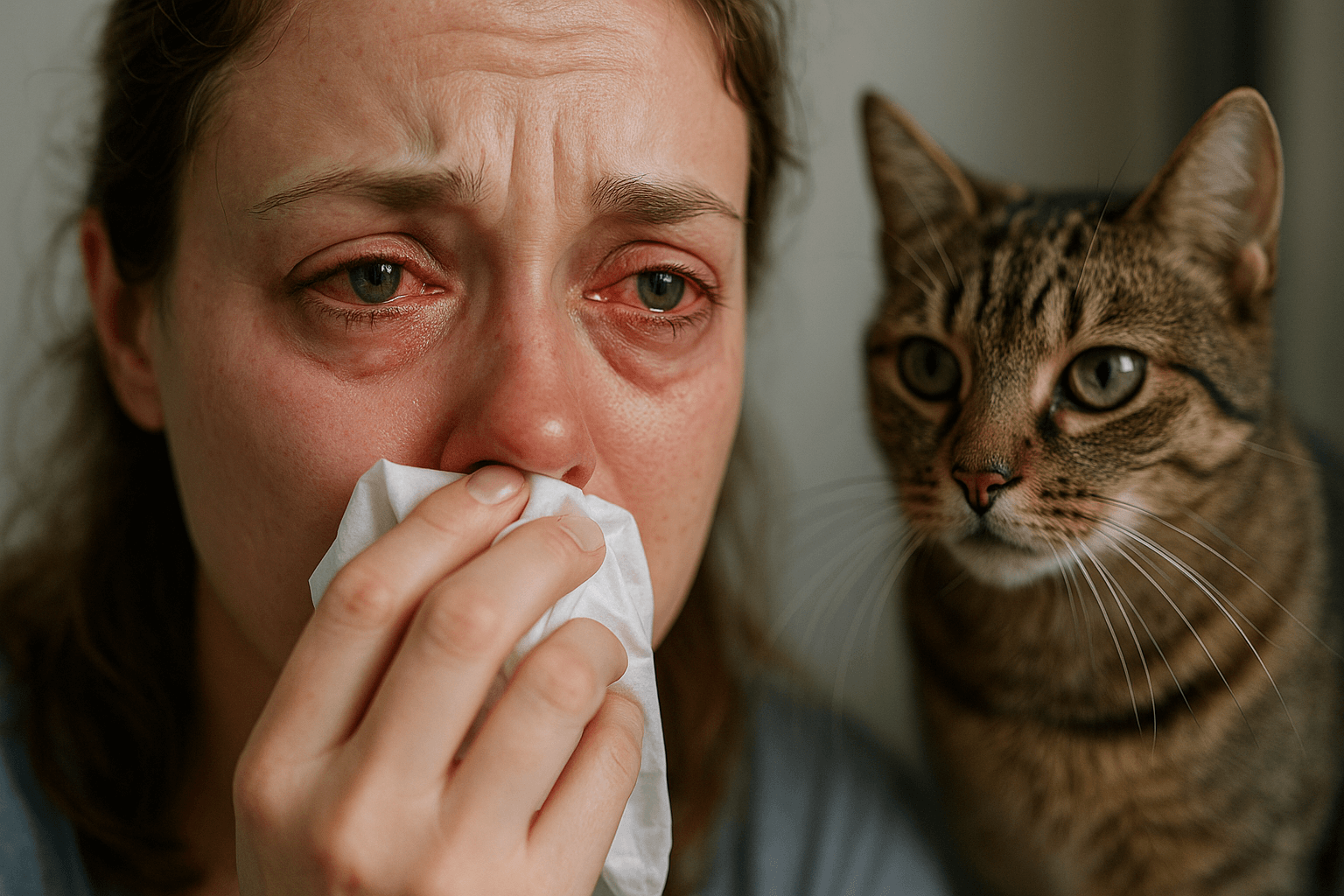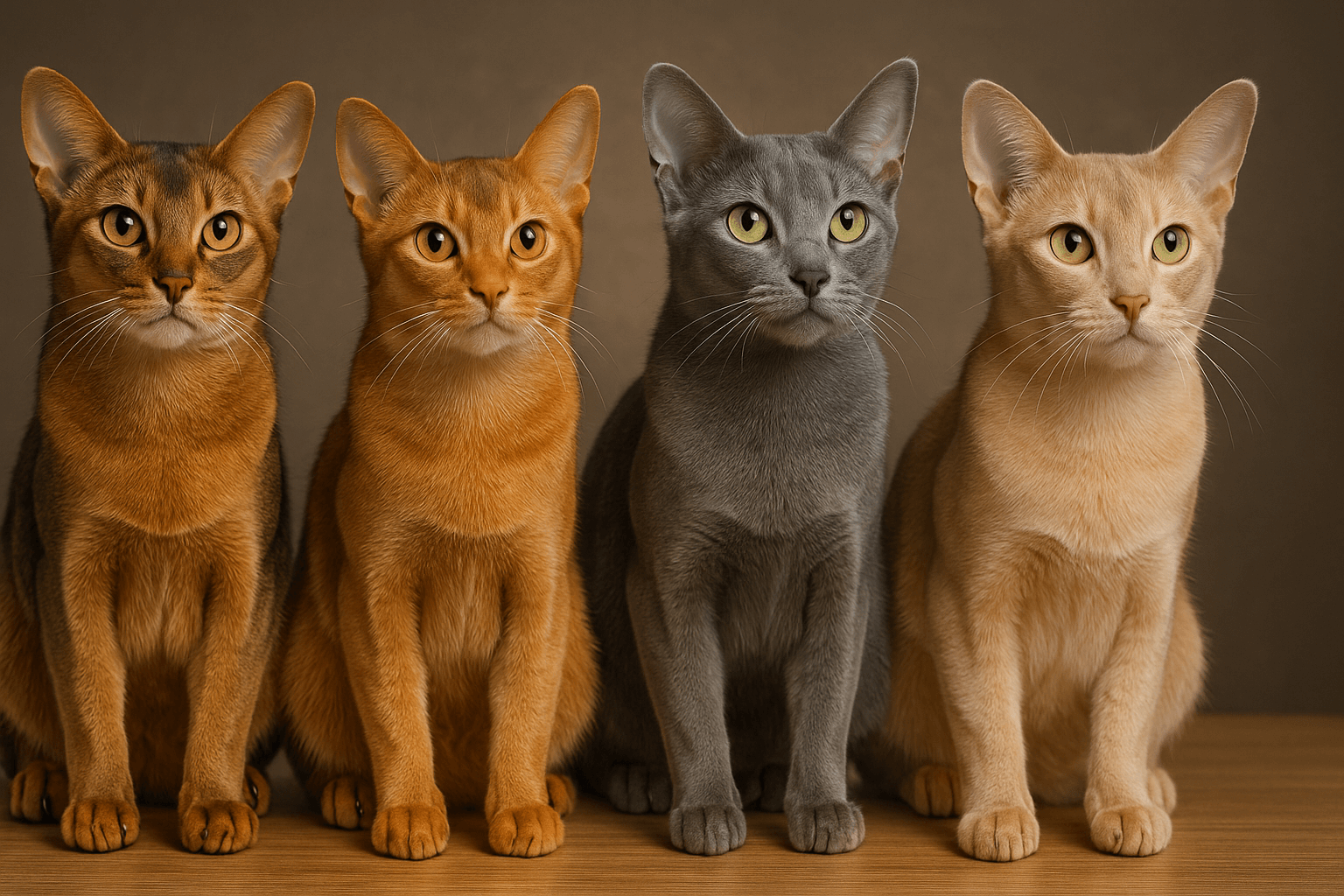How Do I Know If My Cat Died Peacefully? A Gentle Guide for Heartbroken Owners
Losing a cat is not just losing a pet — it’s losing a companion who shared your quiet mornings, your late-night thoughts, and your deepest comforts. When the moment comes, one question lingers in the silence: Did they go peacefully? This isn’t just about physics or biology — it’s about love, closure, and honoring the bond you shared. If you’re asking this question, you already cared deeply. This guide walks you through the quiet signs, the subtle truths, and the compassionate truths that help you know — truly know — your cat passed with dignity, calm, and peace.
The Quiet Signs That Your Cat Passed Peacefully
When a cat dies peacefully, the transition is often quiet, gentle, and free of struggle. These signs are not dramatic — they are tender. They speak of surrender, not suffering.
Stillness without tension:
Your cat lay still, not stiffened or contorted. Their body was relaxed — paws slightly open, head resting naturally, no signs of gasping or twitching.Soft, even breathing before stillness:
Breaths were slow and shallow in their final moments, fading gradually rather than stopping abruptly or with distress.Eyes gently closed or half-lidded:
Their eyes weren’t wide or glassy with panic. Instead, they looked calm — as if they simply drifted off after a long nap.No vocalizations or distress sounds:
There were no cries, yowls, or labored breathing. Their final moments were silent, as if they chose to leave without a fuss.A sense of serenity in the room:
You felt it — a quiet warmth, a stillness that felt more like peace than loss. The air didn’t feel heavy with fear.
These aren’t just observations — they’re affirmations. If your cat passed this way, they didn’t fight. They let go. And that is a gift.
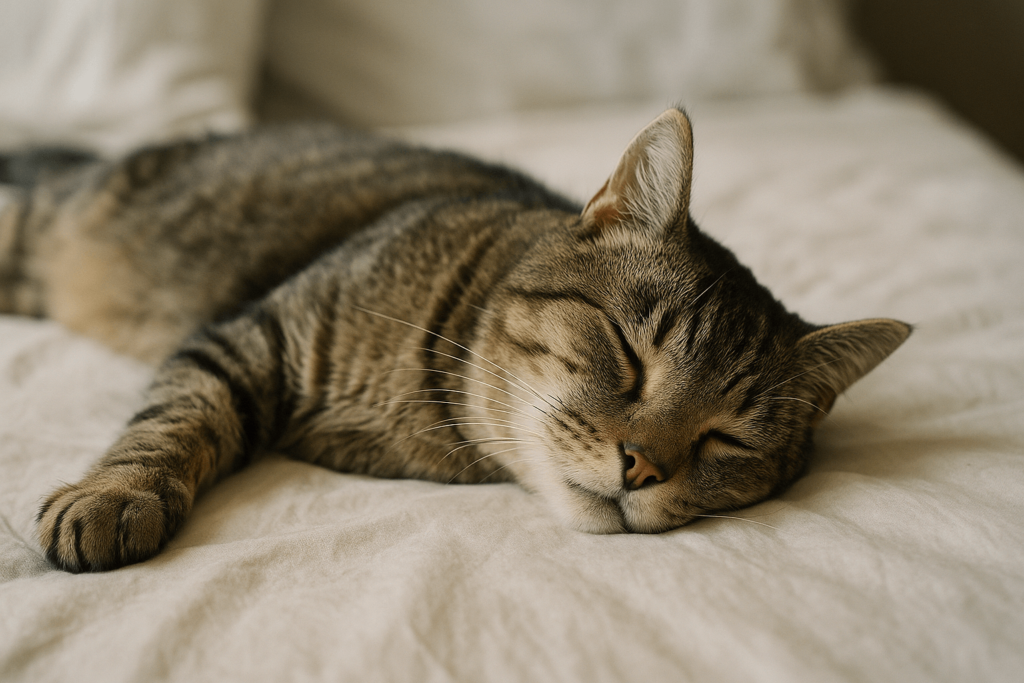
How a Cat’s Body Behaves After a Peaceful Passing
Understanding what happens physically after death can ease confusion and help you recognize the difference between peaceful passing and suffering.
Body temperature gradually cools:
Their body doesn’t instantly turn cold — warmth fades slowly over hours, starting from the extremities. This is natural, not alarming.Muscles relax completely:
Limb positioning becomes loose and natural. No clenched paws, no arched back — just gentle release.No involuntary movements after death:
While minor twitches or muscle spasms can occur briefly due to nerve release, prolonged jerking or convulsions suggest distress before death.Eyes may remain slightly open:
This is common and not a sign of suffering. Cats’ eyelids don’t always close fully after death — it’s simply a matter of muscle tone.Gentle odor may develop slowly:
A faint, non-offensive scent may appear hours later as decomposition begins — but it’s not sudden, sharp, or foul, which would indicate illness or trauma.
Recognizing these natural post-mortem changes helps you separate grief from guilt. What you witnessed was not pain — it was peace.
Check this guide 👉Can a Cat Die from a Cold? Best 7 Expert Tips!
Check this guide 👉Can My Cat Die from Hematoma? Best 7 Expert Tips!
Check this guide 👉Can a Cat Die from a Broken Leg? Best 7 Expert Tips!
| Signs of a Peaceful Passing | Signs of Distress Before Death |
|---|---|
| Body is relaxed, limbs natural, no rigidity | Clenched paws, arched back, or rigid posture |
| Breathing slowed gradually, then ceased | Rapid, shallow, or gasping breaths until the end |
| Eyes soft, closed or gently half-open | Wide, glassy, or staring eyes with visible panic |
| No vocalizations, whining, or crying | Repeated yowling, moaning, or distressed meows |
| Appeared calm before resting — no agitation | Restless pacing, hiding, trembling, or trying to escape |
The Emotional Cues That Tell You They Were at Peace
Beyond the physical, there’s an emotional signature to a peaceful passing — one you, as their human, often feel in your bones.
They sought you out in their final hours:
If your cat curled beside you, rested their head on your lap, or gazed into your eyes one last time — they chose comfort, not isolation.They stopped hiding or fleeing:
Cats in pain often hide. If they came out of their safe space to be near you, it was a quiet act of trust.They ate or drank until the very end:
Even a small amount of food or water in the hours before suggests they were not in acute discomfort.They were calm during vet visits or at home:
If your cat tolerated handling, didn’t hiss or recoil, and responded to your voice — they weren’t in terror.You felt a sense of quiet closure afterward:
Not numbness — not chaos — but a deep, still quiet. Like a song that ended softly, not with a crash.
These aren’t coincidences. They are the final whispers of a soul saying goodbye — gently, fully, and with love.
What to Do If You’re Unsure Whether It Was Peaceful
It’s natural to wonder — to replay moments, to question every breath. If doubt lingers, here’s how to find clarity.
Review their health history:
Were they in chronic pain? Were they being managed with medication? If yes, and they were stable before the end, it’s likely peaceful.Ask your vet for their assessment:
Veterinarians can often tell by body position, muscle tone, and clinical signs whether death was peaceful or preceded by distress.Consider their age and condition:
Senior cats or those with terminal illness often pass quietly — their bodies simply wear out, not break.Trust your intuition:
You knew your cat better than anyone. If your heart feels settled, even slightly — that’s your truth.Allow yourself to believe it:
You don’t need absolute proof. You need permission to find peace. And you deserve that.
Grief doesn’t require perfection. It only asks for honesty — and you’re already being honest by asking this question.
The Role of Euthanasia in Ensuring a Peaceful Passing
For many, euthanasia is the most compassionate choice — and it’s designed to be as gentle as possible.
Sedation comes first:
Your cat is given a calming medication that makes them drowsy, warm, and free of anxiety — often before the final injection.The injection feels like a deep sleep:
It’s not painful. It’s a warm, flowing sensation — like falling asleep in your favorite spot.Breathing slows, then stops:
No gasping. No struggle. Just stillness, like turning off a light.Your presence matters most:
Holding them, speaking softly — this is what they remember. Not the needle. Not the room. Your voice.Many cats smile in their final moments:
Yes — some cats appear to relax into a gentle smile as they drift. It’s a biological response to deep sedation and safety.
Euthanasia isn’t giving up. It’s choosing love over suffering. And if your cat passed this way, they didn’t just die peacefully — they were loved into peace.
How to Honor a Peaceful Passing — Rituals That Heal
How you say goodbye shapes how you remember. Here are gentle ways to honor their quiet departure.
Hold them for a few quiet minutes:
Let their warmth sink into your memory. Whisper thanks. Say “I love you” one last time.Create a small altar or memory space:
A photo, a favorite toy, a candle — a quiet corner where you can sit and remember.Write them a letter:
Tell them what you’ll miss. What they taught you. How they changed you.Plant something in their name:
A flower, a tree, a herb — something that grows, just like your love for them.Don’t rush the process:
Grief has no timeline. Let yourself cry. Let yourself laugh at their quirks. Let yourself be broken — and slowly, kindly, put yourself back together.
Peaceful doesn’t mean easy. But it means meaningful. And your cat’s passing was both.
Common Myths About Cat Death — Debunked with Compassion
There are many myths that cloud our understanding — and sometimes, make us feel guilty when we shouldn’t.
Myth: “If they died at home, it wasn’t peaceful.”
False. Many cats choose to pass in their favorite spot — surrounded by love. That’s the most peaceful place of all.Myth: “They must have been in pain if they didn’t eat.”
Not always. Cats with terminal illness often lose appetite as their body shuts down — it’s a natural part of the process.Myth: “If they were alone, they suffered.”
Cats often hide when unwell. If they came to you, they chose you. If they didn’t, it doesn’t mean they were afraid.Myth: “A peaceful death means they didn’t love me.”
No. It means they trusted you enough to let go.Myth: “I should have known it was coming.”
You couldn’t have. Even veterinarians can’t predict exact timing. You did everything right by caring.
Let go of guilt. You were their safe place. That’s all they ever needed.
Frequently Asked Questions About a Cat’s Peaceful Passing
Can a cat die peacefully without being euthanized?
Yes. Many senior or chronically ill cats pass naturally in their sleep, especially if they’ve been comfortable and pain-free in their final days.
What if my cat died suddenly — was it peaceful?
Sudden doesn’t mean painful. Cats can die from heart failure or stroke with no warning — and often without distress. If there was no struggle, it was peaceful.
Why did my cat look calm even though they were very sick?
Cats are masters of hiding pain. But when they reach the end, many relax — their body releases tension, and their spirit lets go.
How long does it take for a cat’s body to cool after death?
Typically 1–3 hours, depending on room temperature. Cooling begins at the extremities — paws, ears, tail — and moves inward.
Is it normal to feel guilty even if I believe they passed peacefully?
Yes. Guilt is a normal part of grief — not a sign you did something wrong. Be gentle with yourself. You loved them well.
You Gave Them a Good Life — And That’s What Matters Most
You didn’t just feed them. You held them when they were scared. You stayed up with them when they couldn’t sleep. You learned their purr, their gaze, their tiny habits — the way they knocked over your coffee cup, or curled into the curve of your knee. That’s not just care. That’s love in its quietest, most powerful form.
They didn’t need a perfect death. They needed you.
Why Is My Cats Second Eyelid Showing? Best 7 Expert Tips! Understand causes, health signs, and how to respond when your cat’s third eyelid becomes visible.
How Do I Know If My Cat Died Peacefully? Best 7 Expert Tips! Discover the quiet signs of a peaceful feline passing and find comfort in their final moments.
Cat Allergy Eyes: Best 7 Expert Tips! Discover why your eyes react to cats and learn proven strategies for relief—without giving up your feline friend.
Why Do Abyssinian Cat Colors Matter? Best 7 Expert Tips! Discover the genetics, rare hues, and care secrets behind Abyssinian coat colors for a healthier, happier cat.

